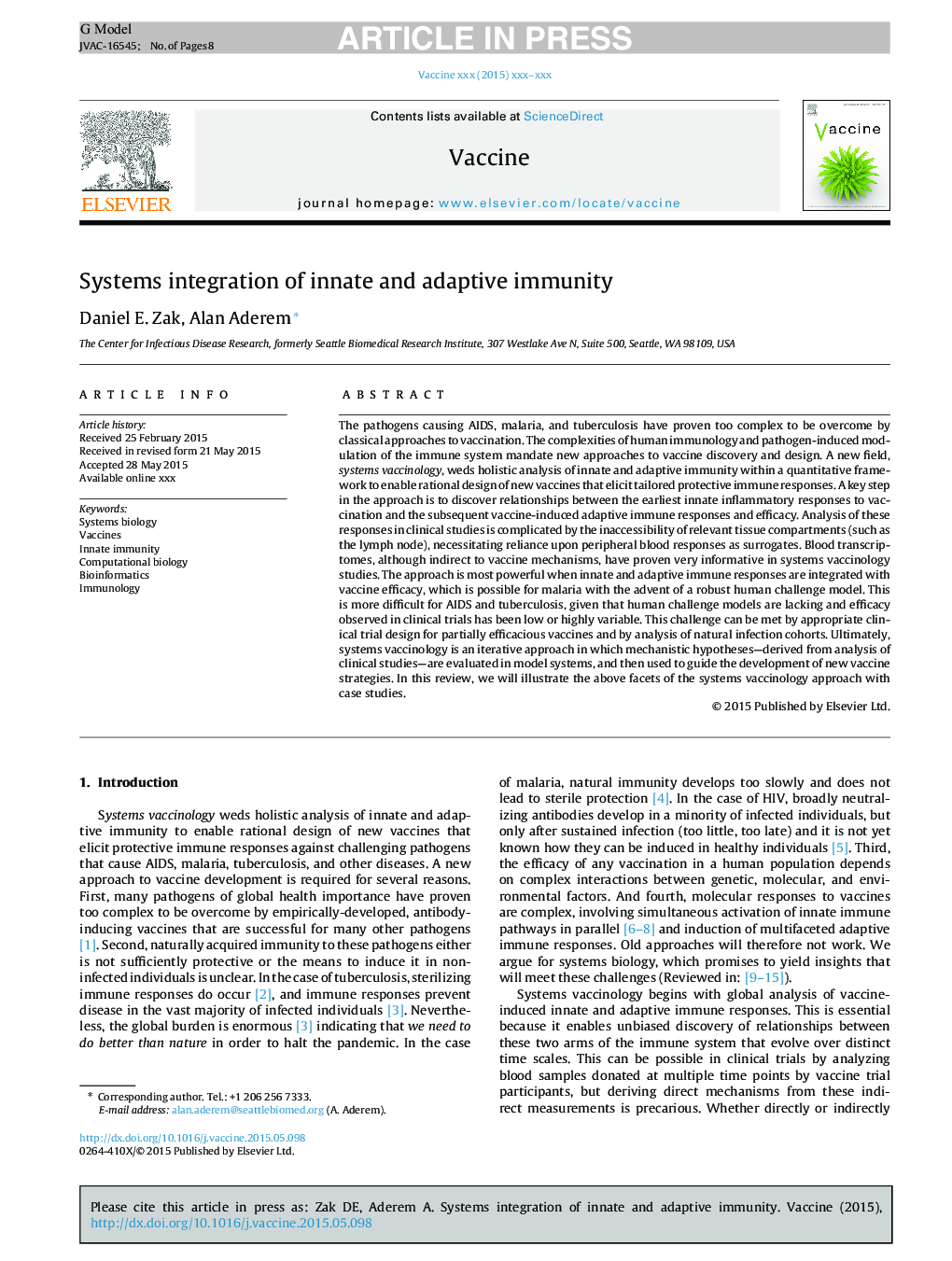| کد مقاله | کد نشریه | سال انتشار | مقاله انگلیسی | نسخه تمام متن |
|---|---|---|---|---|
| 10964073 | 1102702 | 2015 | 8 صفحه PDF | دانلود رایگان |
عنوان انگلیسی مقاله ISI
Systems integration of innate and adaptive immunity
ترجمه فارسی عنوان
یکپارچه سازی سیستم ایمنی ذاتی و سازگاری
دانلود مقاله + سفارش ترجمه
دانلود مقاله ISI انگلیسی
رایگان برای ایرانیان
کلمات کلیدی
زیست شناسی سیستم، واکسن ایمنی فزاینده، زیست شناسی محاسباتی، بیوانفورماتیک، ایمونولوژی،
ترجمه چکیده
پاتوژن هایی که باعث ایدز، مالاریا و سل می شوند، بسیار پیچیده است تا با روش های کلاسیک واکسیناسیون برطرف شود. پیچیدگی های ایمونولوژی انسان و مدولاسیون ناشی از پاتوژن سیستم ایمنی، رویکرد جدیدی را برای کشف و طراحی واکسن ارائه می دهد. یک زمینه جدید، سیستم جراحی سیستم، تجزیه و تحلیل جامع از ایمنی ذاتی و سازگاری در یک چارچوب کمی برای ایجاد طراحی منطقی واکسن های جدید است که پاسخ های محافظتی ایمنی محافظتی را به وجود می آورد. یک گام کلیدی در رویکرد این است که کشف روابط بین اولین واکنش التهابی ذاتی به واکسیناسیون و واکنش های واکنش پذیر واکنش پذیر و ایمنی سازگار باشد. تجزیه و تحلیل این پاسخ ها در مطالعات بالینی توسط عدم دسترسی بخش های بافت مربوطه (مانند گره لنفاوی) پیچیده شده است، که به عنوان جایگزینی برای تکیه بر پاسخ خون محیطی ضروری است. نسخه های خطی خون، اگر چه مکانیسم های واکسن غیرمستقیم، در مطالعات جراحی های سیستم بسیار آموزنده است. این رویکرد قوی تر است زمانی که پاسخ های ایمنی و انعطاف پذیر با یکپارچگی واکسن سازگاری داشته باشند، که ممکن است برای ملاریا با ظهور یک مدل چالش برانگیز انسان باشد. این مسئله برای ایدز و سل بسیار مشکل است، به شرطی که مدل های چالشی بشر کم است و اثربخشی در آزمایشات بالینی کم یا بسیار متغیر است. این چالش را می توان با طراحی آزمایش های بالینی مناسب برای واکسن های نیمه فعال و با تجزیه و تحلیل گروه های عفونی طبیعی مواجه کرد. در نهایت، واکسیناسیون سیستم یک رویکرد تکراری است که در آن فرضیه های مکانیستی حاصل از تجزیه و تحلیل مطالعات بالینی در سیستم های مدل ارزیابی می شود و سپس برای هدایت توسعه استراتژی های جدید واکسن مورد استفاده قرار می گیرد. در این بررسی، جنبه های فوق رویکرد روانشناسی سیستم را با مطالعات موردی نشان خواهیم داد.
موضوعات مرتبط
علوم زیستی و بیوفناوری
ایمنی شناسی و میکروب شناسی
ایمونولوژی
چکیده انگلیسی
The pathogens causing AIDS, malaria, and tuberculosis have proven too complex to be overcome by classical approaches to vaccination. The complexities of human immunology and pathogen-induced modulation of the immune system mandate new approaches to vaccine discovery and design. A new field, systems vaccinology, weds holistic analysis of innate and adaptive immunity within a quantitative framework to enable rational design of new vaccines that elicit tailored protective immune responses. A key step in the approach is to discover relationships between the earliest innate inflammatory responses to vaccination and the subsequent vaccine-induced adaptive immune responses and efficacy. Analysis of these responses in clinical studies is complicated by the inaccessibility of relevant tissue compartments (such as the lymph node), necessitating reliance upon peripheral blood responses as surrogates. Blood transcriptomes, although indirect to vaccine mechanisms, have proven very informative in systems vaccinology studies. The approach is most powerful when innate and adaptive immune responses are integrated with vaccine efficacy, which is possible for malaria with the advent of a robust human challenge model. This is more difficult for AIDS and tuberculosis, given that human challenge models are lacking and efficacy observed in clinical trials has been low or highly variable. This challenge can be met by appropriate clinical trial design for partially efficacious vaccines and by analysis of natural infection cohorts. Ultimately, systems vaccinology is an iterative approach in which mechanistic hypotheses-derived from analysis of clinical studies-are evaluated in model systems, and then used to guide the development of new vaccine strategies. In this review, we will illustrate the above facets of the systems vaccinology approach with case studies.
ناشر
Database: Elsevier - ScienceDirect (ساینس دایرکت)
Journal: Vaccine - Volume 33, Issue 40, 29 September 2015, Pages 5241-5248
Journal: Vaccine - Volume 33, Issue 40, 29 September 2015, Pages 5241-5248
نویسندگان
Daniel E. Zak, Alan Aderem,
